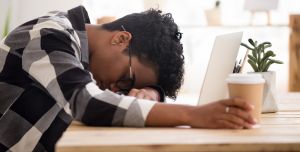Chronic insomnia or sleeplessness plagues more than 40 million Americans, according to a study published in the Journal of Family Medicine and Primary Care. Whether job stress, lifestyle choices, or a medical condition are to blame, chronic insomnia is more than simply frustrating– it often has an impact on physical and mental health too.
In this article, Innovo Detox explores what it takes to detox from sleep meds safely and comfortably.
What Are Prescription Sleep Meds?
Sedative-hypnotic medications, AKA sleeping pills, like Ambien or Lunesta, are used to help people fall and/or stay asleep through the night. They work primarily by suppressing activity in the brain and central nervous system.
The medicines most often prescribed for chronic insomnia fall into one of two categories. Benzodiazepines and Non-Benzodiazepines. Benzodiazepines are believed to have a higher risk of dependence, so their use, especially as a sleep aid, has declined in recent years in favor of the non-benzodiazepine type.
However, both categories are considered controlled substances with a potential for addiction or dependence. Concerns about non-benzodiazepine side effects like dangerous behavior have risen in recent years, leading many people to want to leave these medicines behind.
Benzodiazepine sleep meds include:
- Restoril (temazepam)
- ProSom (estazolam)
- Halcion (trazolam)
Non-benzodiazepine sleep meds include:
- Ambien (zolpidem
- Lunesta (eszopiclone)
- Sonata (zaleplon)
Who Takes Prescription Sleep Aids and Why?
About 4% of the U.S. adult population is using prescription sleep aids. In fact, the use of sleeping pills has tripled since 1998. Growing job stress, overstimulation in the Internet age, and rising anxiety are all cited as reasons for this, but there doesn’t seem to be one definitive answer for the increasing addiction to sleep aids.
What we do know is that growing awareness about substance use disorders has led many doctors and patients alike to reconsider the use of sedative-hypnotic medications to promote sleep. Many believe they may not be the healthiest long-term solution to chronic insomnia and can lead to other problems.
In fact, more people than ever are seeking detox from sleep meds. Non-narcotic and non-pharmaceutical interventions for sleep disorders are also becoming increasingly popular alternatives.

Quitting Ambien or Another Prescription Sleep Aid
It’s understandable that you may want to stop taking a sleeping pill if you are concerned about dependence or side effects. However, If you want to stop sleep medication, it’s very important you seek medical advice.
You should never suddenly stop or alter your dosage of Ambien or any other controlled medication without speaking to a doctor first. Abruptly stopping the use of benzodiazepines, in particular, can lead to dangerous side effects including potentially fatal seizures.
At the bare minimum, quitting Ambien, Lunesta or another prescription sleeping pill you have been taking for a while will lead to rebound insomnia. Rebound insomnia in some cases can be worse than the chronic insomnia you were seeking relief from in the first place.
What to know about quitting Ambien or other sleep aids:
- Never lower or stop taking your sleep medicine dose without consulting a doctor first.
- Understand that quitting on an outpatient basis may take some time and planning.
- Consider an inpatient sleep med detox, especially if your dose is higher.
Do I Need a Detox From My Sleep Meds?
There is more than one way to get off of sleep meds, if that’s your goal. But all of them involve medical supervision of some kind. It’s simply not safe or advisable to try to quit Ambien or another sleep drug on your own.
The good news is there are options for treatment. In some cases, a person might speak to their doctor who will present them with a plan to titrate (lower the dose) gradually over time to lessen the side effects. Someone who has been taking a relatively high dose for years, or who is taking more than prescribed, should consider a sleep med detox.
Entering a private, inpatient sleep med detox, like the one offered at Innovo Detox means receiving around-the-clock medical support. Detoxing from sleep meds in this setting is the safest and most comfortable way to free yourself from addiction to Ambien or other sleeping aid.
Ending Your Dependence on Sleep Meds Safely and Comfortably
Clients who are concerned about rebound insomnia or more serious side effects from stopping a sleeping pill regimen usually find more peace of mind in receiving professional treatment at a private facility, like Innovo Detox.
A sleep med detox in Pennsylvania or one of our other locations takes the guesswork out of the equation. It also means you can avoid months of titrating your dose and tossing and turning in your bed at home.
If you or someone you love is struggling with their dependence on Ambien, another sleep aid or any controlled substance, Innovo Detox is here to help. One call to our confidential detox hotline is all it takes to get answers to your questions about sleep med detox and treatment. You can reach us anytime at (717) 971-4566
